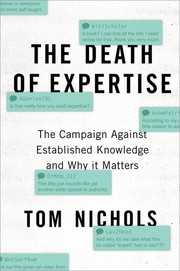Check nearby libraries
Buy this book

A cult of anti-expertise sentiment has coincided with anti-intellectualism, resulting in massively viral yet poorly informed debates ranging from the anti-vaccination movement to attacks on GMOs. As Tom Nichols shows in The Death of Expertise, there are a number of reasons why this has occurred-ranging from easy access to Internet search engines to a customer satisfaction model within higher education.
"Thanks to technological advances and increasing levels of education, we have access to more information than ever before. Yet rather than ushering in a new era of enlightenment, the information age has helped fuel a surge in narcissistic and misguided intellectual egalitananism that has crippled informed debates on any number of issues. Today, everyone knows everything: with only a quick trip through WebMD or Wikipedia, average citizens believe themselves to be on an equal intellectual footing with doctors and diplomats. All voices, even the most ridiculous, demand to be taken with equal seriousness, and any claim to the contrary is dismissed as undemocratic elitism. As Tom Nichols shows in The Death of Expertise, this rejection of experts has occurred for many reasons, including the openness of the Internet, the emergence of a customer satisfaction model in higher education, and the transformation of the news industry into a 24-hour entertainment machine. Paradoxically, the increasingly democratic dissemination of information, rather than producing an educated public, has instead created an army of ill-informed and angry citizens who denounce intellectual achievement and distrust experts. Nichols has deeper concerns than the current rejection of expertise and learning, noting that when ordinary citizens believe that no one knows more than anyone else, democratic institutions themselves are in danger of falling either to populism or to technocracy---or in the worst case, a combination of both. The Death of Expertise is not only an exploration of a dangerous phenomenon but also a warning about the stability and survival of modern democracy in the Information Age."--Jacket.
Check nearby libraries
Buy this book

Previews available in: English
Subjects
Higher Education, Sociology of Knowledge, Theory of Knowledge, Internet, Expertise, Information society, Political aspects, Ability, Learning, Information society -- Political aspects, Knowledge, Theory of -- Political aspects, Knowledge, Sociology of, Expertise -- Political aspects, Education, Higher -- Political aspects, Internet -- Political aspects| Edition | Availability |
|---|---|
|
1
The death of expertise: the campaign against established knowledge and why it matters
2017, Oxford University Press
in English
0190469412 9780190469412
|
aaaa
Libraries near you:
WorldCat
|
Book Details
Table of Contents
Edition Notes
Includes bibliographical references and index.
Classifications
The Physical Object
ID Numbers
Community Reviews (0)
Feedback?| October 19, 2023 | Edited by Scott365Bot | import existing book |
| August 4, 2020 | Edited by ImportBot | import existing book |
| July 19, 2019 | Created by MARC Bot | import new book |










